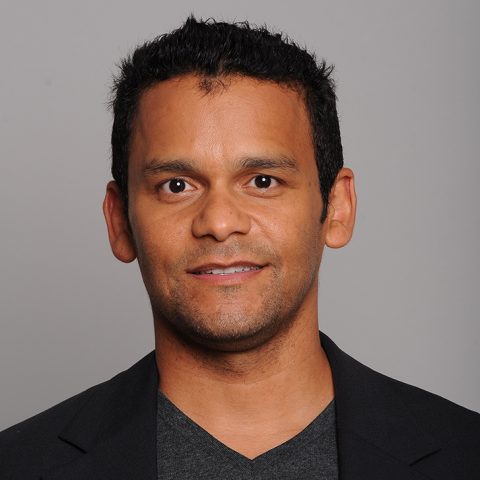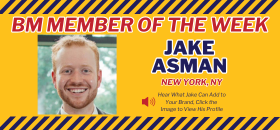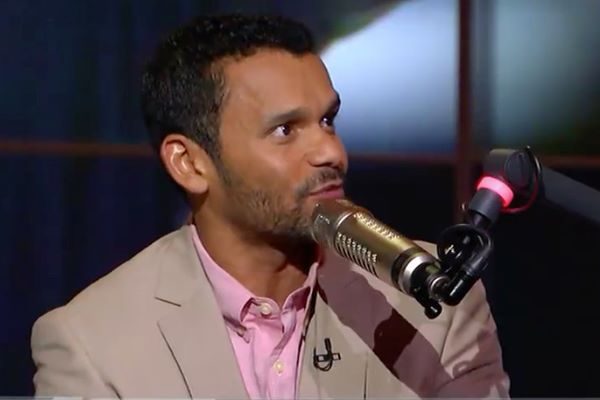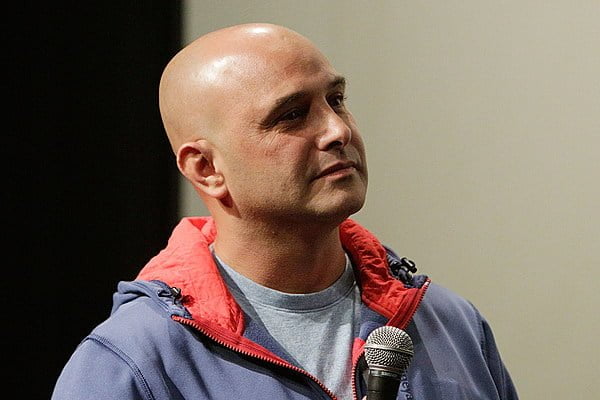Some people are scared to say something unpopular. FOX Sports Radio and FS1 host Jason McIntyre is not one of these people. His style doesn’t resemble a conservative play-caller in football. It’s more like the rapper Bone Crusher repeating, “I ain’t never scared,” from his 2003 hit song. Jason doesn’t operate a dink-and-dunk offense on the sports radio airwaves. He slings it, takes chances, and is aggressive. He’s a fearless host that will gladly face the listeners he riles up.

There is often a misperception that a strongly opinionated and unapologetic host has to be a bit of a wild card — a loose cannon comparable to a rabid dog. This definitely isn’t the case with Jason. He’s a very nice guy who is also incredibly smart. It isn’t a requirement to be a jerk in order to produce strong stances. Jason is like a pitcher delivering some sweet chin music to a hitter only to then tip his cap and wish his competition a nice day.
As the previous owner of The Big Lead, Jason points out some interesting parallels between the sports blog and sports radio. He also talks about his days of owning the site anonymously. As a guy who has already accomplished a lot and loves to challenge himself to reach new heights, it’ll be fun to keep track of what Jason accomplishes next. Enjoy.
Brian Noe: What gives you the most enjoyment as a sports broadcaster?
Jason McIntyre: One of the big things in our industry, you know this, you have to be fearless. You can’t care what people are going to say about your take or your opinion. It does feel good when you’re out on a limb, out on the ledge saying something like, listen, I don’t want to be in the Odell Beckham business. If I were the Giants I would trade him. And all these Giants fans — “You’re an idiot! He’s so good.”
What happens like two months later? They trade him. Now the Browns after one year, “I don’t know we might move on.” Now the recent Odell Beckham mishap. It’s like come on; you couldn’t see these things coming from a mile away? But people are kind of nervous and scared to go out and say something unpopular.
I had the same thing with Baker Mayfield. His rookie year, I’ll never forget they were playing the Jets and they win the game. Baker was tremendous, he comes off the field and what’s he doing? He’s looking at his cell phone. Huge win. That’s the first thing you’re doing before you do any interviews? You’re looking at your cell phone.
I had been saying this guy’s out there. He likes to read social media and favorite comments by people. He’s favorited stuff I’ve said on FOX Sports Radio. He uses that as ammunition. You’ve got to have that inner drive to be better, not I want to get back at Joe in Milwaukee who said this about me. I just think that’s the wrong attitude. He’s so into the social media, it kind of scares me. What happened to Baker Mayfield this year? He was atrocious. I’m not picking on the Cleveland Browns here or anything. I’m just saying the idea of being fearless and going out there on the ledge all alone on an island and turning out to be right, it feels like you’re in a good place, like you’re not afraid of anything.
BN: What’s the biggest challenge for you as a broadcaster?
JM: One of the issues that I’ve found — and again I’m pretty new to this stuff. I’ve only been in radio for I think four years. I did one year at Yahoo! Sports Radio and then my agent parlayed that into FOX. Then I came out to do the TV stuff for FS1. I would say the one thing is just being consistent across the board. If one day I’ve got to do a video for FOX on NFL picks, the next day I’m going on Lock It In, then I’m going on the radio, you kind of change your mind. It’s tough to be like, yes, I think this is going to be the score on Tuesday. Then new information comes out like injuries. Oh, I kind of changed my mind a little bit. Then you see by Saturday morning, hey, all the money is on one side. Whoa, maybe I need to change my mind.

I guess it’s a good thing because I’m not afraid to admit I was wrong. You’re going to be wrong a lot. I’m on the wrong side of this. There’s new information presented to me. You know that as a host. You might do your Portland show and talk about breaking news and then boom within the next five days a whole new narrative emerges and you go on your radio show on FOX and you say, listen, I got it wrong the first time. There’s nothing wrong with that. I think the biggest challenge is being consistent. A lot of guys, they don’t want to admit when they’re wrong. Me? I have no problem.
BN: Which is better — to come right out with honesty and say, I really don’t know how this game is going to play out, or just pick a side and almost make yourself believe that’s the way it’s going to go?
JM: Yeah, that’s a tough one because you can’t do a segment on TV where you just come on and say I have no idea. You can’t. They’ll just be like, all right, well we’ll find someone who can. That’s the reality. You have to have an opinion. That’s why you’re here. You got to this place because you are fearless. You’re not worried about being wrong and you have interesting opinions that are going to make people think.
BN: What’s something that you’ve carried over to sports radio from your days of owning The Big Lead?
JM: The best part of owning a website was you could see every 10 minutes, every 30 minutes, every hour what posts work and what doesn’t. You pretty quickly realize that, hey man, the NFL is super popular. It’s number one. The NBA is number two and then there is a huge drop off. There’s just not as much interest in terms of debatability or topics in baseball. There just isn’t. Now obviously the Houston Astros are a phenomenal story right now. I think that has potential, but I’m curious to see whether or not it drives traffic or if it’s a social media story.
I’m sure you’ve seen, Brian, there’s a colossal difference between what works on TV, what works on radio, what works on the internet, and then there’s social media. Because you know social media skews very left. People are easily outraged at anything. All these people would get worked up on social media, but then when it came to clicking on these stories, they didn’t. We saw a disconnect between stories that you have to read and social media where you can be flippant and have comments. I thought that was fascinating.
BN: How did you get your start in the beginning of your career?
JM: So I got out of college — this was of course before social media had popped — I get out of college and I wanted to work at a newspaper. My dream all along had been I want to cover the Lakers for a newspaper. I would have season tickets also, which made no sense, but that’s when you’re a little kid and you think, oh, Magic Johnson’s awesome and you want to be there. I got into newspapers and then about three years in I was on the staff with Adrian Wojnarowski and a couple other guys at the Bergen Record. It was just like wait a sec; this newspaper thing is starting to hit some walls here. The internet is starting to pop.
I’ll never forget I had a moment where I decided — let me buy my URL JasonMcIntyre.com. I’ll put my resume on there and my clips so I can get noticed around the country. I put that out there and one of my colleagues on staff sees it and reports me to the top guy. I get called into a glass office at the Bergen Record, “Jason, I don’t know if this is legal. You’re republishing our stories.”
I said how different is this than clipping out my stories from the newspaper and sending it to somebody? I’m not making any money off of this. What are you talking about? I realized at that point these are some old folks in the newspaper industry. They don’t get the internet. I need to get out of here.
I had left for a better job at Us Weekly magazine and lived in New York City. Within two years I started The Big Lead. It’s hard work. It’s luck. It’s a combination of a lot of factors. Everything lined up perfectly. My girlfriend at the time, who’s now my wife, had a good job so I was able to not make any money off the website for a good year after quitting my job. It was just like “This is where I want to be. This is perfect.” Then the next thing you know the website leads to TV and FS1 and the radio. It was a springboard to me being in sports and all this fun stuff.
BN: What were your big breaks while you were still running The Big Lead

JM: The big one was when Colin Cowherd was at ESPN. I don’t necessarily remember what was written, but it was something on The Big Lead. This was when it was anonymous by the way. Nobody knew I was running it. He read something and he’s like, wouldn’t it be great if we could just blow this website up? It just so happens that it was his first day replacing Tony Kornheiser and he had a lot of new listeners. All of these listeners went to the website and it was like a mom-and-pop shop back then. Our server was like in Romania for $27 a month. Super cheap, because I’m not spending tons of money. I didn’t really spend anything out of pocket to start the website. The website basically blew up. It was knocked offline.
NPR reached out to me and was like, hey, we want to interview you. “I’m like can I do it anonymously?” They’re like “No, you have to put your name on it.” I was like, “All right, I can’t talk to you guys.” But they still wrote about it. Then the ESPN ombudsman wrote about it and Cowherd got reprimanded. That was the one big one that kind of put me on the map.
The one after that was Sports Illustrated’s Richard Deitsch, who I’m sure you know him, does a lot in the media. He did the unmasking of me when I was ready to put my name on it. Once I started making money I was like, okay, I’ll put my name on it. I revealed that I was the guy behind it. Sports Illustrated wrote about it, which was very cool. Then I guess the third one would be when it sold. It was written about in The New York Times. My parents clipped it and framed it and all that fun stuff. That I think got the eyeballs of TV. I met with FOX, which turned into FS1 and then it went from there.
BN: Why were you so careful about not revealing that you were the guy running it?
JM: A couple things. Number one was I had the magazine job at Us Weekly. I didn’t think it would be a good look if posts were going up on the site as I’m sitting there in the office at Us Weekly or wherever I was reporting. I wasn’t really doing stuff while on the job. I would just wake up at 6am, listen to Howard Stern, and then set up like two or three posts. I would set them to post throughout the day. I was able to do both at the same time, which was nice.
The other aspect was I didn’t know where this was going. I think the fact that it was anonymous — there was like an air of mystery. Who the hell is this guy? Where is this guy getting his information? Of course you know how the media works, once you start writing about the media, they definitely want to be on your side because they’re afraid of you. I had all of these media guys reaching out to me trying to become friendly. I got to be friendly with some of them obviously. They would give tips and they would be like, oh, I heard this is happening at ESPN or at Sports Illustrated. Then that would become a story. Next thing you know it wasn’t just sports fans reading, it was the important people, the decision makers at magazines and TV and radio. I guess once you get the media and the fans it’s a big win.
BN: How did you become friends with Cowherd?
JM: Well it’s funny. After he did that whole blow-up thing, I guess maybe six months later was the Sports Illustrated reveal. Then six months later I had started doing interviews with media people, but more in-depth. I spent the day at the Big East Tournament with Jay Bilas and hung out with him. I was showing that I’m not just a guy who would do hot takes and media gossip, so I would do these longer form pieces.
I emailed ESPN for one of them. I was like, hey, can I come up and interview Cowherd? They reached out to Cowherd and Cowherd was like, “Oh yeah, that’s great.” Next thing you know I went up to Bristol for a night and hung out with Cowherd for the day. It was pretty incredible. I guess in a way he kind of liked or respected what I had built and that I was a normal guy.
Listen man, Brian you’re in radio, you meet some of these guys, and there are some strange individuals to say the least. I like to think of myself as a normal dude. I have a wife, kids, regular guy, and I guess he liked that and we just kind of got to be friendly.

BN: That’s cool, man. What would you consider to be your biggest strength and your biggest weakness as a sports radio host?
JM: I would say the strength we kind of covered a little bit, just a fearless mentality. I’m not afraid of anybody. If somebody’s going to come after me, whatever. Hey, you want to talk sports? That’s fine. Discuss other stuff? There’s no reason to be afraid of anyone. I’ve always had that mentality.
I play a lot of pickup basketball. I always want to guard the best guard on the other team. I want to challenge myself. I don’t want to guard some scrub. I’m not going to get better. Being fearless I think would be my biggest strength.
My weakness I guess I get too into sports sometimes if that’s possible. I know that’s kind of nerdy to say. I don’t like to focus on weaknesses. There are a lot of guys in the TV industry who basically are like, hey, this person can’t do this. My thought is who cares what they’re not good at? Focus on what they’re good at. It applies to sports. All these teams were like “I don’t want Lamar Jackson. He can’t do this.” The Baltimore Ravens said “No, no he can do this.” Then they basically built their franchise, their offense, around him and he’s the MVP of the league putting up historic stuff. I know they had a playoff stinker there, but he had like 500 yards of offense. I think that’s a mentality — don’t focus on the negatives, focus on what you do best and really hammer that and build off of it.
BN: What are some of your goals that you would really like to accomplish?
JM: Well we always want forward momentum in anything we do. I’ve been doing weekend radio for three or four years on FOX. I would love to have a five day a week show. I’ve been doing TV now at FS1 for three years. I’d love to have a daily show, but I’ve become a lot more patient. It could be living out here in L.A. I grew up in the Northeast. You may or may not know this, but in the Northeast you better be 15 minutes early if you want to be on time. Out here in L.A. it’s like you’re 30 minutes late, oh well, glad you showed up. You’re on time. It’s just totally different and a different speed.

I’ve gotten a lot better I think with just being patient and letting things come to you. You never want to force anything whether it’s a radio show you’re not ready for, or a TV show you’re not ready for because you’ve seen a lot of people really want things badly. They get it and what happens? It doesn’t end well for them quickly. I’m in no rush. I’m having fun. I’m learning practically every day from some of the best in the business. I’ll see Skip Bayless in the building and chat him up and learn something. I’ll see Cowherd. FOX has great executives. I love talking to Scott [Shapiro]. I had breakfast with Scott and Don [Martin] last year and learned a lot of stuff. I like those guys a lot. I’m just a sponge out here in the industry trying to get better every day as cheesy as that sounds.
Brian Noe is a columnist for BSM and an on-air host heard nationwide on FOX Sports Radio’s Countdown To Kickoff. Previous roles include stops in Portland, OR, Albany, NY and Fresno, CA. You can follow him on Twitter @TheNoeShow or email him at bnoe@premierenetworks.com.








